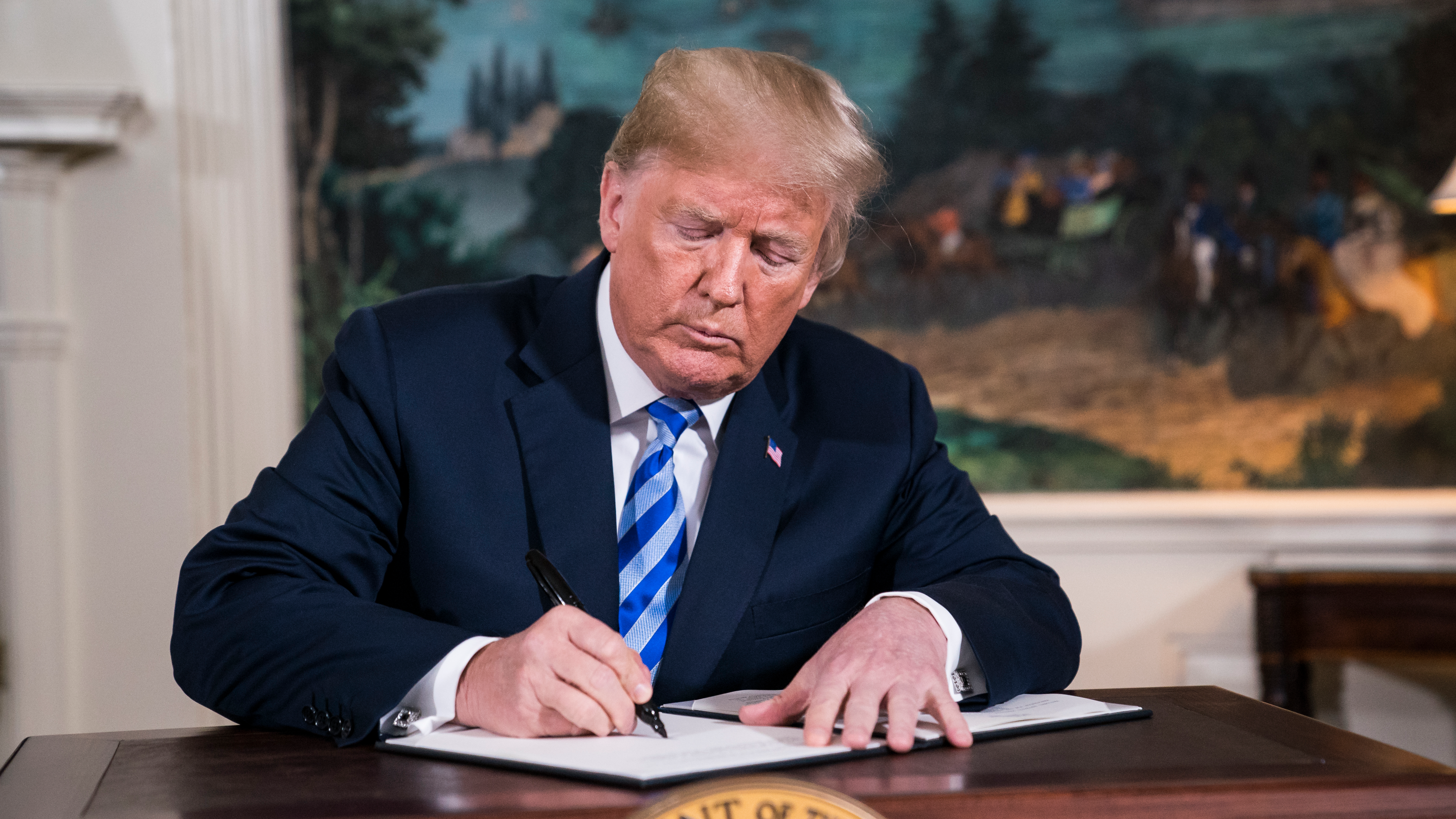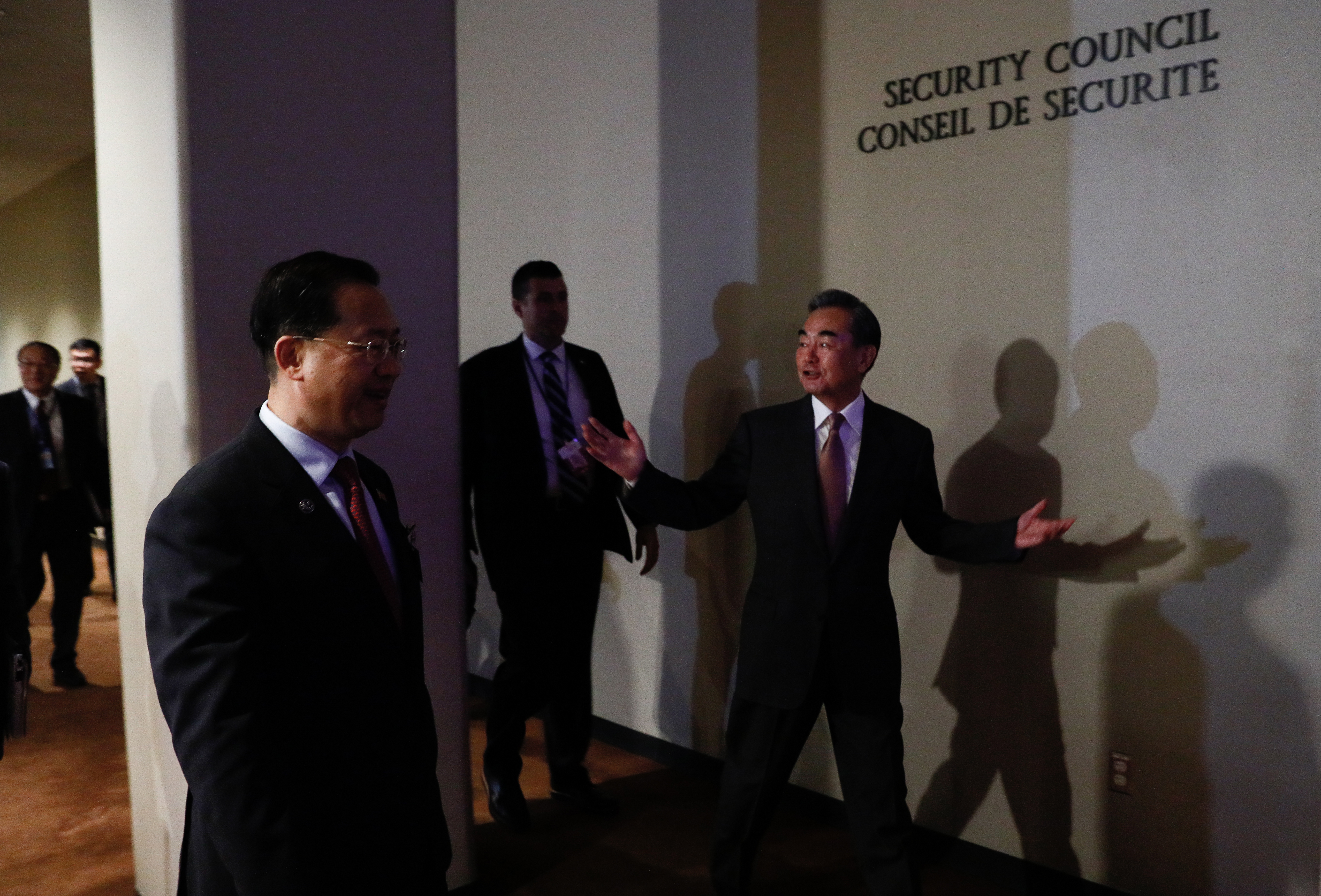
U.S. President Donald Trump signs a National Security Presidential Memorandum as he announces the withdrawal of the United States from the Iran nuclear deal in the Diplomatic Reception Room of the White House, Washington D.C., U.S., May 8, 2018. /Getty Images
U.S. President Donald Trump signs a National Security Presidential Memorandum as he announces the withdrawal of the United States from the Iran nuclear deal in the Diplomatic Reception Room of the White House, Washington D.C., U.S., May 8, 2018. /Getty Images
Editor's note: Ken Moak taught economic theory, public policy and globalization at the university level for 33 years. He co-authored a book titled "China's Economic Rise and Its Global Impact" in 2015. The article reflects the author's views, and not necessarily those of CGTN.
The recent rejection by the United Nations Security Council (UNSC) of U.S. President Donald Trump's demand to extend the arms embargo on Iran under the Joint Comprehensive Plan of Action (JCPOA) or the Iran nuclear deal was a "pushback" against America not seen since the days leading to the Iraq War. The JCPOA was reached between the U.S., UK, France, China, Russia and Germany (The Permanent Five+1) in 2015 largely to discourage Iran from developing nuclear weapons.
However, Trump withdrew from it, saying "it is a bad deal" for the U.S. without explaining why. Many suspected that he cancelled the deal just to spite his predecessor – as it happened with the Trans Pacific Partnership (TPP) trade agreement which former President Obama reached with 11 other nations.
The Dominican Republic supported, Russia and China opposed, the UK, France and Germany abstained on the voting of the U.S. proposal to extend the arms embargo on Iran. The opposing UNSC members argued that since Trump withdrew from the deal in 2018, the U.S. has no right to extend the arms embargo under the JCPOA framework.
Instead of accepting the UNSC decision, Trump threatened a "snapback," allowing the U.S. to re-impose all sanctions against Iran. U.S. Secretary of State Mike Pompeo alleges that despite the U.S. withdrawal from the nuclear deal, the U.S. is still a participant of what he called "a political agreement," according to NPR. Although the U.S. argument amounted to what the Russian representative likened "a shareholder sold all the shares but wanted to remain a board of director member," it seemed determined to follow through with the "snapback."
Moreover, Pompeo threatened sanctions on China and Russia if they meddled in the "snapback." He went on to warn the three European allies that "it is dangerous to side with the ayatollahs, China and Russia," a not so subtle threat of retaliation. If that is not bullying, then what is?
The question is: Why did Trump insist on extending the arms embargo on Iran at this juncture when he and his advisers probably are well aware of a "backlash"? Extending the arms embargo might have something to do with China and to a lesser degree, Russia.
China and Iran are reportedly getting near to signing a tentative 25-year and 400-billion-U.S.-dollar comprehensive strategy partnership agreement on trade, investment, politics, culture and security. Under the agreement, China would be investing in Iran's energy, transportation, banking, cybersecurity, weapons development and other sectors. The two countries are also expected to increase trade.

China's Foreign Minister Wang Yi (R) ahead of a ministerial meeting of the P5+1 countries and Iran held on the sidelines of the 74th session of the UN General Assembly at the UN headquarters to discuss implementation of the Joint Comprehensive Plan of Action, Manhattan, U.S., September 25, 2019. /Getty Images
China's Foreign Minister Wang Yi (R) ahead of a ministerial meeting of the P5+1 countries and Iran held on the sidelines of the 74th session of the UN General Assembly at the UN headquarters to discuss implementation of the Joint Comprehensive Plan of Action, Manhattan, U.S., September 25, 2019. /Getty Images
The Iran-China strategic agreement will have many implications for the Middle East and the world, none of which is said to be favorable to the U.S. Investing in Iran's oil industry could guarantee China's energy security, reducing its purchase of U.S. oil and gas. Building roads and other infrastructures would expand the Asian giant's Belt and Road Initiative (BRI), raising China's influence. Perhaps equally, if not more, important is the fact that the deal would strengthen the two countries' footprint in the Middle East and beyond, thereby diluting the U.S. influence around the globe.
The U.S. might also be concerned with China and Russia selling large quantities of arms to and cooperating with Iran in developing its weapons arsenal, both of which would change the security calculus in the Middle East. With advanced lethal weapons, Iran would be in a position to challenge Israel, Saudi Arabia and other U.S. allies in the region if not America itself.
From that perspective, Trump's demanding the UNSC supports his arms embargo extension after it expires in a month or so is meant to block China and Russia from the Middle East. In reimposing all sanctions against Iran and threatening the same on China and Russia, the U.S. hopes to discourage China from expanding its BRI in and selling arms to the Islamic republic.
However, supporting the embargo would render the UNSC an ineffective platform for world peace and security. The UNSC, the real power behind the UN, was set up with five permanent members, and each has veto power for a purpose; disallowing any single nation from running the world. Allowing a U.S. "snapback" would be just that, making the UNSC, and by extension the UN, a U.S. agency.
A U.S. "snapback," therefore, should not and must not be allowed. In addition to it being blatant bullying, history will tell that U.S. unilateral sanctions or decisions did insurmountable damages to targeted countries and the world. Sanctioning Venezuela, for example, has turned the country into an "economic basket case," forcing many to flee the country to neighboring countries, thus destabilizing the region. Imposing tariffs on foreign imports eroded economic growth around the world, including the U.S.
The U.S. should also understand that it cannot take on the world because its national interests and security are dependent on its relationship with other countries. Accepting the U.S. dollar as the world reserve currency, for example, has afforded America to incur "infinite debts" without losing credit worthiness. If that stops, the U.S. would not be able to print as much money as it needed for economic recovery or buy arms to strengthen its military.
Moreover, sanctioning China and Russia might be easier said than done. Would the U.S. really go to war with the two nuclear powers if they defy the sanctions and sell arms to Iran? Would the U.S. decouple from China if it invests in Iran's energy, transportation and other sectors? Probably not.
(If you want to contribute and have specific expertise, please contact us at opinions@cgtn.com.)